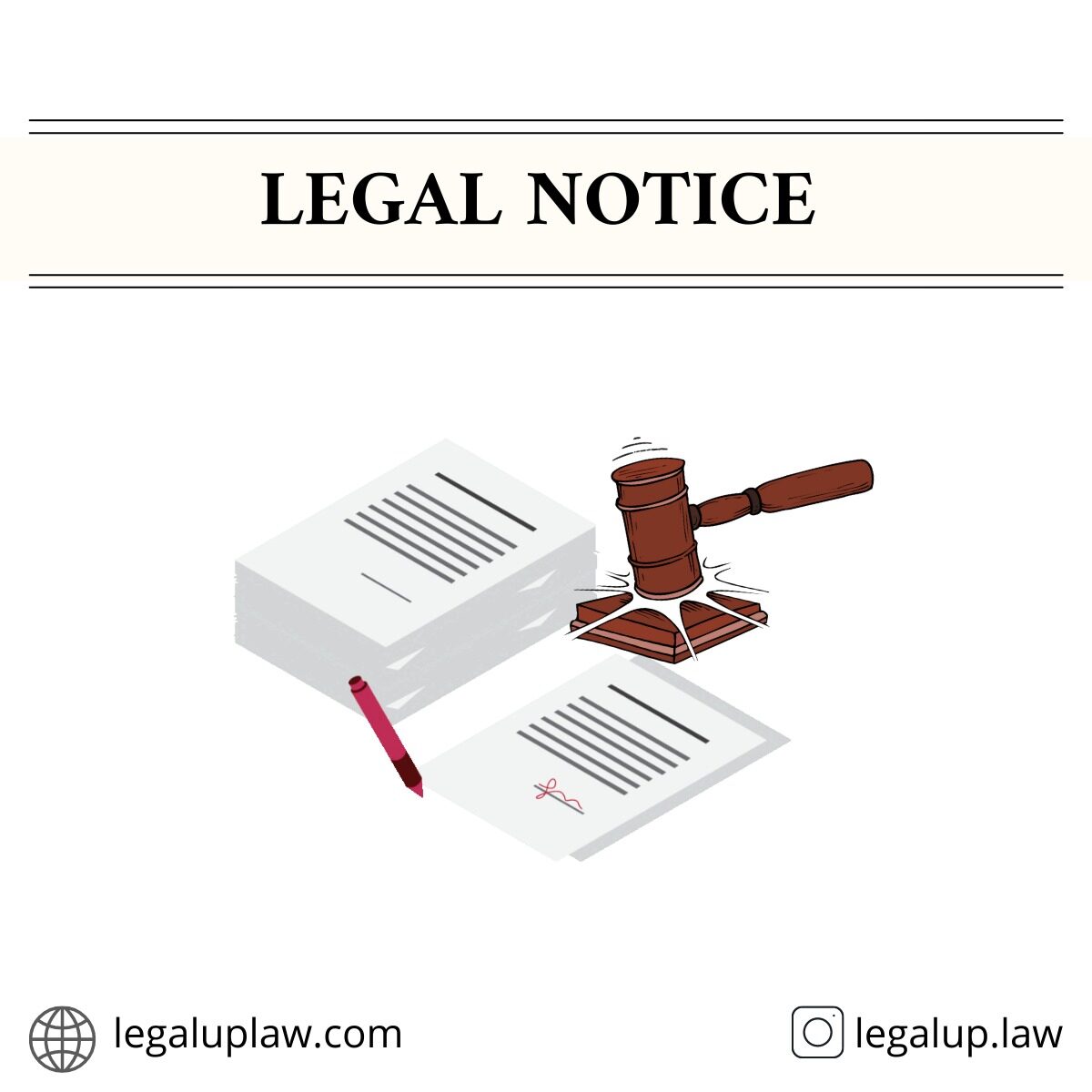A Legal Notice is a classified written document, written on behalf of a person or organization by an advocate, to another entity or person indicating them that their particular action has caused damages to our client, and you are requested to solve that problem within the specified period of time mentioned in the notice, otherwise, a suit will be filed against you.
The purpose behind sending a Notice to a person is to alert the other person for any cause, both for the future and present.
Note– A notice sent by an advocate on behalf of a person or organization is only a legal notice, whereas a notice which is sent by a person on its own will not be termed as legal notice.
Legal notice sent through an e-mail is also a valid Legal Notice.
A notice contains the section number and the name of the act for which the complaint will make liable to the wrongdoer in the suit if they fail to solve the issue. The time given in every legal notice, in different cases is different.
Table of Contents
Why Legal Notice is encourged, instead of a legal proceeding?

In today’s modern and technical world, every other person is facing legal issues with another person.
And due to this huge number of legal issues, not having an option other than litigation would lead to an immense amount of litigation filed in the courts.
Currently even after having the provision of giving a Legal Notice is there, the burden of cases on courts is immense, if this provision is not provided then the situation would have become worse.
- Legal Notice gave a privilege to both the parties to say whatever they want by taking time and with full understanding, in written form.
- Both the parties can settle on the disputed facts by understanding each other facts and the mindset that if they go to the court, the investment of time and money would be more than now.
- It helps to reduce the court’s workload because the problem can be solved outside, on their own grounds.
What to do if you receive a legal notice?
- Reply to the legal notice within the specified period of time. It is mandatory to reply to the legal notice, becuase it will create bad image of your in the court if any suit is filed by the party.
- Negotiate on the terms of the problem or solve it. Do not directly agrees on the wishes and points of the opoosition part. For.eg there will be a situation where you fails to repay the loan, and you receive a legal notice regarding the same. As a party you can negotiate on the terms like if you increase the time to repay my loan, i will definetely repay you the loan.
- If you disgree on the terms of the legal notice, please contract to you any of the best lawyer and send a counter legal notice, specifying him that these terms of the legal notice is false and we do not considered it.
What happens if a legal notice is received in Civil Cases?
In Civil Cases, FIR is not lodged against the wrongdoer. Simply a legal notice is sent to the person, to alert him that this particular action of his/her is directly creating problems to the complaint, and please do look into it within the specified time to solve it, or be will be filing a suit against you.
For. eg- If farmer-A is irrigating his land and while irrigating the water get’s divert from his land to his neighbour land of farmer-B, causing damage to the crop. The person whose crop is damaged can ask for compensation and request him to irrigate his land carefully in the future by sending a legal notice.
It is not compulsory that for every action a legal notice has to be sent by the complaint. The action could be solved even by requesting him for the same, if the wrongdoer doesn’t solve the problem then a legal notice is sent to him by an advocate on behalf of the complaint.
Note- Nowadays, most of the legal notice is filed under the cheque bounce case, covered under Section 138 of The Negotiable Instruments Act, 1881.
Section 138 deals with the cases of cheque bounce. Cheques bounce basically means if you have to pay for something to another party, but your bank account does have a sufficient amount to withdrawn, then the cheque is dishonoured or we can say that it is a cheque bounce.
In this situation, the other party has the power to send a legal notice, through his advocate to the party in default, on the fact that your cheque has been dishonoured and you are liable to pay the amount along with the compensation because of the pain which our client suffers, unit the specified period mentioned in the notice.
What happens if a legal notice is received in Criminal Case?

In every criminal case, an FIR is lodged against the wrongdoer in the area where the cause of action has arisen.
But there are cases where police authorities do not lodge the FIR against the person, in this situation an advocate on behalf of the victim can send a legal notice to the opposite party, to the commissioner of police, and also to the local police station to alert them that the person mention in the notice is the wrongdoer and he/she has done this crime and is liable under this section of CRPC.
It is sent to alert them to lodge an FIR of the victim, so that case against the wrongdoer can be filed, and if no action is taken in accordance with the legal notice then a suit would be filed against the wrongdoer.
When the court looks into the matter of the case, the court orders the police in charge to lodge an FIR against the wrongdoer and file a charge sheet as soon as possible after the investigation is done.
What is the format of a Legal Notice?
Page 1
- On the top of the page, align-center will come the name of the law firm, along with the address.
- Now, the names of the advocates along with their number. One is align to the left and the other name will align to the right of the page.
- Then, Speed Post is written align-center.
- To the right side, below speed post comes the date- day/month/year.
- Then, the address are written where we need to send the notice.
Page 2
- From the second page, name and address of the client is written. and in same line it is written we hereby serve upon you the following legal notice on its behalf (behalf of client, advocate is sending a legal notice).
- Now, the fact of the matter is written.
For ex:- If our client purchased a expensive phone and he takes the insuarance from XYZ company for 2 years from the date of purchase, insuring his/her phone form any kind of technical fault, water damage and any type of physical damage, then the company will pay on behlaf of the person.
After 2 months the client faces some software technical issue, for which he files an insurance claim, the insurance company fails to provide the claim to the client.
Now, all these facts of the matter are written and in the last part, it is written that the mentioned person and address in the legal notice are hereby informed to look into the matter to solve it either by of compensation of the material plus the suffering which the client has suffered within a reasonable period of time.
Last page-
- In the last page it is written A Copy is Kept, which means that a copy of the notice is kept by the advocate to.
- below that the name of the advocate or the firm is written along with their signature.
Can you file a Legal Notice against a public servant or not?
Yes, we can file a legal notice against a public servant and to the government.
There are matters in which public officers or governments are involved in the wrong means during their official duty, and for that, they should be punished or should give compensation to the party. Generally, the time given to reply on the notice is 2 months, and after that one can file a suit against the person mentioned.
One can give a legal notice under Section 80 of The Code of Civil Procedure, 1908. The notice is not only sent to the individual but the senior officer also.
Conclusion
Therefore, a legal notice plays a major role in making the other party aware of the issue and the step that would be taken against the person if not replied and complied with his part of obligations in the provided time period. This also helps in bringing the matter down to a solution with performing their parts, and not moving to the court. Thus saving the court from unnecessary trials which can be solved outside the court.


